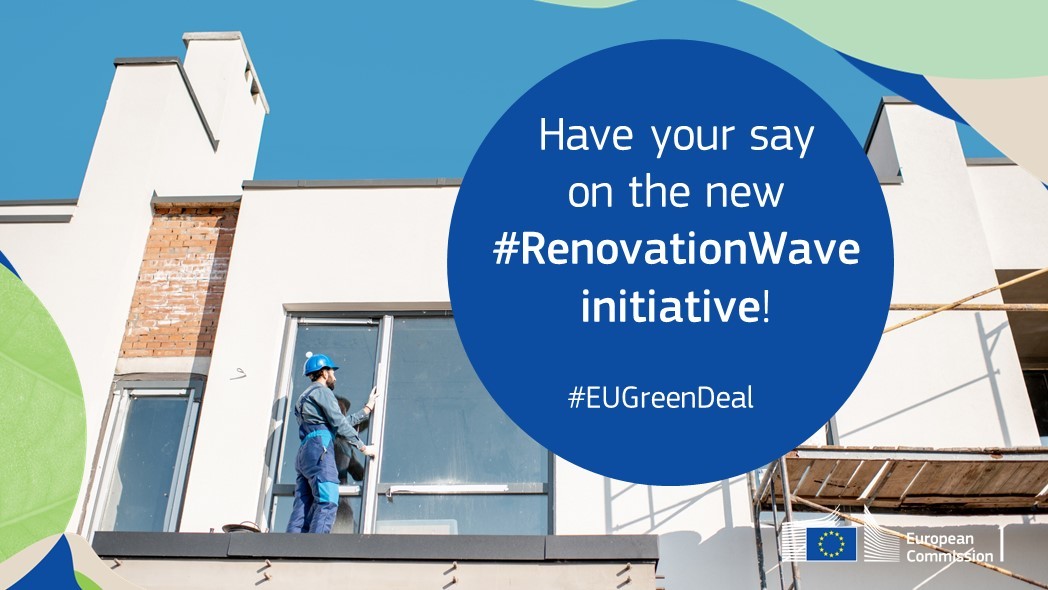Renovation Wave for Europe: greening buildings, creating jobs and improving lives
"The green recovery starts at home. With the Renovation Wave we will tackle the many barriers that today make renovation complex, expensive and time consuming, holding back much needed action. We will propose better ways to measure renovation benefits, minimum energy performance standards, more EU funding and technical assistance encourage green mortgages and support more renewables in heating and cooling. This will be a game changer for home-owners, tenants and public authorities."
by Kadri Simso, Commissioner for Energy
Context
The Commission published on 14 October 2020 a new strategy to boost renovation called "A Renovation Wave for Europe – Greening our buildings, creating jobs, improving lives" (COM(2020)662) as a part of the Green Deal.
Building renovation is a clear priority of the Commission and the Renovation Wave is a flagship initiative under the EU Green Deal. The Commission will ensure that EU programmes and instruments are put to good use to support and unlock investment in building renovation, promoting sustainable quality renovations, inclusiveness, digitalisation and protection of cultural heritage value, as well as related job creation and industrial leadership. The Commission encourages Member States to use EU financial resources to implement national, regional and local support schemes for stimulating quality building renovation.
- The EU building sector is responsible for approximately 40% of EU energy consumption and for 36% of the EU greenhouse gas emissions.
- 75% of existing buildings are energy inefficient.
Objectives
- to accelerate the transition away from fossil fuels and integrate renewables,
- to optimize consumption by cutting energy bills and improving the health of EU citizens,
- to accelerate the switch to efficient heating and cooling systems,
- to boost both energy efficiency and indoorenvironment quality of European homes and workplaces,
- to renovate 35 million inefficient buildings by 2030,
- to create 160,000 green jobs in the construction sector by 2030.
Priorities
- improving the usability of the building and accessibility for persons with disabilities and elderly people (e.g. step-free access to or lift in a building is vital for a wheelchair-user but also helpful for parents with strollers),
- tackling energy poverty and worst-performing buildings,
- renovating public buildings, such as administrative, educational and healthcare facilities,
- decarbonizing heating and cooling.
How?
- Strengthening information, legal certainty and incentivesfor public and private owners and tenants to undertake renovations. The Commission will revise in 2021 the Energy Efficiency and the Energy Performance of Buildings Directives.
- Providing funding tools. These include direct EU budget support for quality building renovations, attracting private investment through the Renewed Sustainable Finance Strategy. In this respect the Recovery and Resilience Facility, with EUR 672.5 billion, can support renovation investment and energy efficiency-related reforms across Member States. Furthermore, the Cohesion policy will be a complement to the temporary Recovery and Resilience Facility to provide integrated support to building renovation, including for tailor-made renovation programmes at local and regional levels.
- Attracting private investment and stimulating green loan financing. The Commission will start a series of initiatives involving the Energy Service Companies (ESCOs), the Energy Efficiency Financial Institutions Group (EEFIG) and the Sustainable Energy Investment (SEI) Forums, to help customers to access funding on cheaper terms. The goal is to promote the development of dynamic private financing complementing public funds, tax incentives and other forms of public financial support.
- Scaling up technical assistance and make it closer to regional and local actors, in particular by strengthening the European Local Energy Assistance (ELENA) and using the technical assistance window under the Resilience and Recovery Fund.
The European Initiative for Building Renovation of the European Investment Bank (EIB) will be a precious asset to achieve this objective.
Positive effects
- in employment terms, the Renovation Wave initiative will generate numerous local, green jobs (especially for SMEs),
response to energy poverty which will bring down bills for citizens,
reduce emissions and energy use to support climate targets,
improve quality of life, health and well-being for residents,
create decarbonised, digitalised and smarter homes.
For more information get in touch with us at:
By accepting you will be accessing a service provided by a third-party external to https://www.schumanassociates.com/

